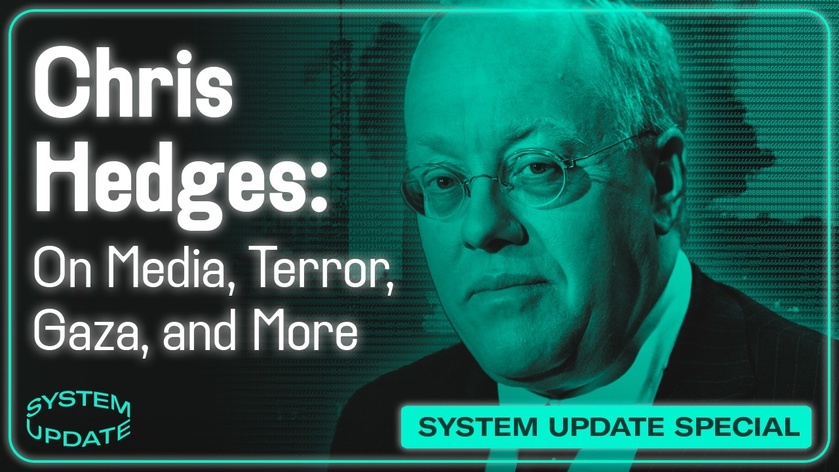Watch the full episode HERE
It's Friday, September 20.
Tonight: As I often say on this show, one of the purposes of the twice-a-week After-Shows that we do for our Locals community is to hear suggestions from our viewers about topics we should cover and future guests we should invite. Without a doubt, the person whom our viewers have most frequently and vocally demanded that we speak to is the former New York Times reporter turned independent media powerhouse, Chris Hedges. Why haven't you put Chris Hedges on? When is Chris Hedges coming on? What can we do to help you get Chris Hedges on? And we've been helpfully hectored for months this way by our loyal viewers.
The reality is that I am a long-time fan of Chris Hedges. I was reading his work even before I entered journalism, and we have been trying for months to find a time when he can come on. The stars finally aligned this week, and we sat down with him for a full hour just a couple of days ago, in a wide-ranging discussion about wars, past and present bipartisan foreign policy dogma, corporate media repression, state propaganda, the 2024 election, and so much more. There are really very few people in Western journalism who understand the Middle East better than him. A fluent speaker of Arabic, he covered multiple wars and conflicts in that region for years for The New York Times, including spending months, if not years in Gaza, the West Bank, Lebanon, and Israel, as well as covering the wars in Kuwait and Yugoslavia in 2002 and 2003. However, he was forced out of The New York Times because he revolted against their attempts to dilute his reporting to make it align with the institutional ideology of the paper, and most of all, to try to control what he could say. While that may seem a risky move for any reporter to leave The New York Times as an established war correspondent, especially back in 2003, before the advent of exploding and far-reaching independent media, it turned out to be, unsurprisingly, the best possible move for him. Since that departure from The New York Times, both on independent news outlets and on his outstanding Substack page, Chris has broken major stories, providing some of the most informed and developed knowledge of U.S. policy in the Middle East and in general is completely free to express himself however he wants without the slightest fear of consequences.
Independent media is not a panacea. Earlier this year, Hedges was let go by the ostensibly independent left-wing site, The Real News Network, apparently as a result of his insistence, relentlessly, vocally, and uncompromisingly criticizing Joe Biden, Kamala Harris, and the Democrats in the lead-up to the election. But we would be a lot less informed and challenged without Chris Hedges's ongoing ability to thrive thanks to independent media. We are thrilled to show you our discussion with him, not only because it temporarily will put a stop to the hectoring from our audience now that we've had him on, but mostly of all because his perspectives are so worth hearing.
Interview: Chris Hedges

G. Greenwald: Chris Hedges, it's so great to have you on the show. I have to say that our audience has been hectoring us for months, if not longer, saying why isn't Chris Hayes on the show? Why isn't Chris Hedges coming on? And I kept saying it's not for lack of effort. We just haven't been able to align our schedules. And I'm so glad that finally, we were able to do so. And I'm thrilled to have you on.
Chris Hedges: Well, thanks, Glenn. I'm happy to be here.
G. Greenwald: Absolutely. So, there are a lot of substantive issues about U.S. foreign policy and domestic politics that I want to talk to you about but before I get to that, I want to talk about media and how media has changed and how it's enabled people like you to find an audience without being constrained by corporate media. Because if people ask me who are the journalists who have become most influential in independent media, you're definitely one of the 3 or 4 people I would instantly say are among the top. And the irony of that is that when I first got to know you and know your work, you were not in independent media. You were in the very opposite, sort of the belly of the beast, at The New York Times, right after the immediate aftermath of 9/11. For those people who don't know the story, because I think it's such a revealing story about how corporate media works and how it worked back then, talk about the reasons why you're not any longer with The New York Times.
Chris Hedges: I would say there were two major reasons. I spent seven years in the Middle East, much of that time covering Gaza. I was based in Cairo. The Jerusalem bureau for The New York Times did not really cover Gaza, they made very little effort to cover Gaza. So, I would be sent from Cairo and live in Gaza for weeks at a time. I was very frustrated with the way The New York Times covered Palestine and the way they did it, which was different. I went on to cover the war in Yugoslavia, for instance, and it wasn't like this at all. So, if I was reporting on, let's say, an airstrike on a refugee camp, in Jabalia, or somewhere else, they would pepper the article with, you know, I may have been interviewing an eyewitness, but that immediately would be followed with a different account coming from the IDF out of Jerusalem or Tel Aviv or somewhere. It had the effect of essentially neutralizing the story. By the end of the story, you could believe whatever you wanted to believe. And that was very difficult.
Finally, in frustration, I used my vacation time to go to Gaza to write an article called “A Gaza Diary,” where I spent 10 days living in the refugee camp of Khan Yunis with a great cartoonist, Joe Sacco, who wrote “Palestine” and “Footnotes on Gaza,” and I said, I'm not going to interview any official, I'm not going to interview any PLO official, I'm not going to interview Hamas officials, I'm just going to write, day by day, what it's like in this refugee camp. That was an eruption at The Times when it was printed. And I was told although I'm an Arabic speaker, I think they only had two or three at the paper at the time, that I would never cover the Middle East again. So, that was the first blow.
The second blow was the call to invade Iraq. I had spent a lot of time in Iraq. I had not only gone into Kuwait in the first Gulf War – I was not embedded, I was what they called a unilateral, which meant that I wasn't part of any military pool but I had grafted onto a Marine Corps unit, had gone into Kuwait with them and then stayed on in the Middle East for The New York Times, covering the destruction of the stockpiles and Saddam Hussein had stockpiles of chemical weapons, mostly in artillery shells. So, I covered all of that. I knew he might have had a tiny residue, but I knew he didn't have weapons of mass destruction. I knew it was a lie. I knew the whole premise of invading Iraq, which of course had nothing to do with 9/11, was the fiasco it became certainly up until Gaza, you know, the greatest war crime. I mean, you have to go back to Vietnam or something. And I couldn't keep quiet about that. So, I spoke very publicly on big media programs, and that angered The New York Times, especially after I was booed off the commencement stage and I was given a formal written reprimand from the paper. Though under guild rules, you get the reprimand done in writing, I was called into the office of an assistant managing editor, Bill Schmidt, and given the reprimand, presented with the reprimand and then if I violated that reprimand, if I continued to speak about the war, then I, under guild rules, could be fired. I wasn't going to stop speaking about the war and that ended my career at The New York Times.
G. Greenwald: The debate that is just eternal, that people on the left and right have, is over the bias of The New York Times. What is the ideological posture of The New York Times? Conservatives internally insist there is some left-liberal bias or whatever, and then you have people on the left or even liberals who insist that it has this kind of institutional conservative bias. For me, I've always thought that the ideology of The New York Times kind of allegiance to the foreign policy community, the U.S. Security State, and it's hard to, especially these days, place it on the left or the right. But I'm wondering and I think there are a lot of people who haven't lived through that history post 9/11, the Iraq war, or people who just did but decided to forget about it. In those instances where The New York Times was diverting your stories, basically negating the things you were reporting with IDF statements, giving them equal weight, and then, especially, with this idea that you somehow couldn't speak out against the Iraq war, even though many, many New York Times journalists were free to speak out in favor of it and were doing that, would you say that the reason was that the Sulzberger family, or The New York Times, just institutionally has this ideological bias in favor of Israel, in favor of wars? Or was it more just the kind of post-9/11, uber jingoism that prevailed where, you know, I would say the majority of people in corporate media decided that their patriotic duty was to align with the War on Terror or post-9/11 policies of the U.S. government?






















